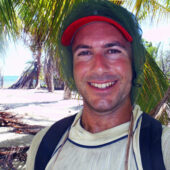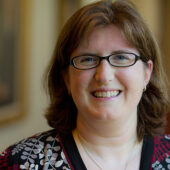An unprecedented threat to Peru’s cloud forests
 Researchers at Wake Forest have pieced together startling new evidence that shows rapid 21st century warming may spell doom for tree species in Peruvian cloud forests, with species losing 53 to 96 percent of their populations.
Researchers at Wake Forest have pieced together startling new evidence that shows rapid 21st century warming may spell doom for tree species in Peruvian cloud forests, with species losing 53 to 96 percent of their populations.Categories: Research & Discovery, University Announcements

 Scott W. Klein, professor and chair of the English department, was recently named artistic director of the Secrest Artists Series, a signature performing arts series at Wake Forest. The 2013 series opens on Thursday, Sept. 12, with the Carolina Chocolate Drops in Wait Chapel.
Scott W. Klein, professor and chair of the English department, was recently named artistic director of the Secrest Artists Series, a signature performing arts series at Wake Forest. The 2013 series opens on Thursday, Sept. 12, with the Carolina Chocolate Drops in Wait Chapel. Nineteen professors taking part in the new Faculty Fellows program will become familiar faces in the first-year residence halls. Each residence hall will have at least three faculty members assigned within this partnership program between the Provost's Office and the Office of Residence Life and Housing.
Nineteen professors taking part in the new Faculty Fellows program will become familiar faces in the first-year residence halls. Each residence hall will have at least three faculty members assigned within this partnership program between the Provost's Office and the Office of Residence Life and Housing.
 The Hybrid Sterling Energy Generator (HySterE) panel is one of the world’s first combined photovoltaic and thermal collection generators. Developed by researchers at Wake Forest, it could transform how we use the sun’s energy.
The Hybrid Sterling Energy Generator (HySterE) panel is one of the world’s first combined photovoltaic and thermal collection generators. Developed by researchers at Wake Forest, it could transform how we use the sun’s energy.
 Senior Lizzie Woods spent 10 weeks researching 20th century censorship and the Hollywood Production Code. Originally interested in book censorship, Woods found herself intrigued by the film and soon learned that during the 1930s, film censorship was getting stricter while books were more becoming more obscene.
Senior Lizzie Woods spent 10 weeks researching 20th century censorship and the Hollywood Production Code. Originally interested in book censorship, Woods found herself intrigued by the film and soon learned that during the 1930s, film censorship was getting stricter while books were more becoming more obscene.
 The amphibious mangrove rivulus is an extraordinary fish. It can survive out of the water for up to 66 days. Ph.D. student Benjamin Perlman is shedding new light on how the 3-inch rivulus moves across the ground once it gets there.
The amphibious mangrove rivulus is an extraordinary fish. It can survive out of the water for up to 66 days. Ph.D. student Benjamin Perlman is shedding new light on how the 3-inch rivulus moves across the ground once it gets there.
 This summer, junior Alex Buchholz lived in Azerbaijan and studied the relationship of energy and political outcomes in Central Asia. His research focused on the political ‘game’ newly independent states, Russia, and the United States have played over the control of oil and gas reserves.
This summer, junior Alex Buchholz lived in Azerbaijan and studied the relationship of energy and political outcomes in Central Asia. His research focused on the political ‘game’ newly independent states, Russia, and the United States have played over the control of oil and gas reserves. Senior Brian Shoemaker is helping a national team of scientists answer a million-dollar question: Could a substance that resembles baby powder curb global carbon emissions?
Senior Brian Shoemaker is helping a national team of scientists answer a million-dollar question: Could a substance that resembles baby powder curb global carbon emissions? Law professor Tanya Marsh recently testified before the U.S. House Committee on Oversight and Government Reform regarding the impact of Dodd-Frank. Her testimony was based on a report she co-authored with Joseph Norman (’12), her former student who is now an attorney in Charlotte, N.C.
Law professor Tanya Marsh recently testified before the U.S. House Committee on Oversight and Government Reform regarding the impact of Dodd-Frank. Her testimony was based on a report she co-authored with Joseph Norman (’12), her former student who is now an attorney in Charlotte, N.C.
 Jamie Floyd has come up with a new way to teach music theory. The rising senior is using an Xbox Kinect and a visual programming language called Max to help people recognize different pitches of sound.
Jamie Floyd has come up with a new way to teach music theory. The rising senior is using an Xbox Kinect and a visual programming language called Max to help people recognize different pitches of sound.